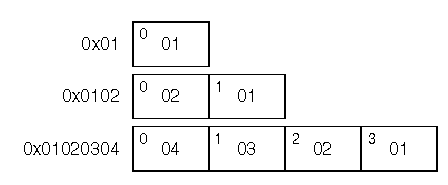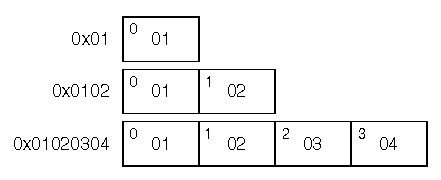
|
|
ELF provides an object file framework to support multiple processors, multiple data encodings, and multiple classes of machines. To support this object file family, the initial bytes of the file specify how to interpret the file, independent of the processor on which the inquiry is made and independent of the file's remaining contents.
The initial bytes of an ELF header (and an object file)
correspond to the e_ident member.
e_ident[ ] identification indexes
| Name | Value | Purpose |
|---|---|---|
| EI_MAG0 | 0 | File identification |
| EI_MAG1 | 1 | File identification |
| EI_MAG2 | 2 | File identification |
| EI_MAG3 | 3 | File identification |
| EI_CLASS | 4 | File class |
| EI_DATA | 5 | Data encoding |
| EI_VERSION | 6 | File version |
| EI_PAD | 7 | Start of padding bytes |
| EI_NIDENT | 16 | Size of e_ident[] |
| Name | Value | Position |
|---|---|---|
| ELFMAG0 | 0x7f | e_ident[EI_MAG0] |
| ELFMAG1 | 'E' | e_ident[EI_MAG1] |
| ELFMAG2 | 'L' | e_ident[EI_MAG2] |
| ELFMAG3 | 'F' | e_ident[EI_MAG3] |
e_ident[EI_CLASS],
identifies the file's class, or capacity.
| Name | Value | Meaning |
|---|---|---|
| ELFCLASSNONE | 0 | Invalid class |
| ELFCLASS32 | 1 | 32-bit objects |
| ELFCLASS64 | 2 | 64-bit objects |
Class ELFCLASS64 is reserved for 64-bit
architectures. Its appearance here shows how the object
file may change, but the 64-bit format is otherwise
unspecified. Other classes will be defined as necessary,
with different basic types and sizes for object file data.
e_ident[EI_DATA]
specifies the data encoding of the
processor-specific data in the object file.
The following encodings are currently defined.
| Name | Value | Meaning |
|---|---|---|
| ELFDATANONE | 0 | Invalid data encoding |
| ELFDATA2LSB | 1 | See below |
| ELFDATA2MSB | 2 | See below |
e_ident[EI_VERSION] specifies the
ELF header version number. Currently, this value
must be EV_CURRENT, for e_version.
e_ident. These bytes are reserved and set to
zero; programs that read object files should ignore them.
The value of EI_PAD will change in the future if
currently unused bytes are given meanings.
Encoding ELFDATA2LSB specifies 2's complement values, with the least significant byte occupying the lowest address.

Data encoding ELFDATA2LSB
Encoding ELFDATA2MSB specifies 2's complement values, with the
most significant byte occupying the lowest address.

Data encoding ELFDATA2MSB